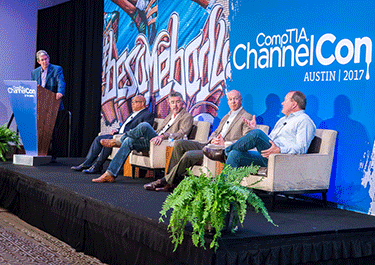
Building a smart city involves a lot of things going right, but it’s not about any one element of it – it’s about all of it. According to experts in this space, a successful smart city means working across departments, serving citizens’ and visitors’ expectations, boosting networks and building partner relationships.
Day two of CompTIA ChannelCon, being held at the JW Marriott Austin, July 31 to August 2, saw a panel called “Smart Cites: The Future is Now” moderated by Peter Murray, executive director, dense networks, The Social Think Tank. Panelists included Jay Boisseau, CEO, Vizias; Kurt Jacobs, director, global markets, alliances and solutions, JMA Wireless; Damian McCabe, general manager, Americas, Eseye; and Charles Ramdatt, director of smart cities and special projects, City of Orlando.
The moderated discussion was insightful and far-ranging in exploring smart cities. Here are four key takeaways from the conversation.
Avoid Silos
The City of Orlando has been awarded two awards for its work with smart cities; one from the Smart Cities Council and another from the U.S. Department of Transportation. Murray asked Ramdatt how has Orlando – noted as the largest rental car and tourism market in the world – been so successful in its efforts. “We had been working in silos,” Ramdatt said, adding that his city had been accomplishing great things across different departments but it needed to integrate them.
Match Expectations
A smart city has to be capable of what people think it should. “For smart cities, networks have to be built up for what people expect, not just cellular carriers,” Jacobs said. “In an NFL stadium we put up the equivalent of 70 cell towers.”
It’s About Networks
McCabe expanded on the networking issue. “Capacity is improving across networks as we consume more and more data,” he said. “The arrival of 5G [the fifth generation of mobile networks] will be a game changer in the next 12 to 18 months.” He explained as people move around and outside of smart cities, what’s needed is interoperability between mobile operators to create “a network of networks.”
Partner Up
Murray pointed to a slide of all the partners Vizias has acquired in developing Austin as a smart city, and it was a considerable amount. “Our first year of operations has been about building relationships,” Boisseau said, adding that the next step is to move into getting funding for projects conceived in the past year. To that end, Vizias is putting an RFP to its consortium of partners and beyond.
He added, “It’s not about any one element of smart cities. It’s about all of it.”
